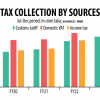Experts call for predictable tax policy, unified VAT

Business leaders and policy experts in Bangladesh have urged the interim government to adopt predictable tax policies and accelerate digitalisation of the tax system in order to foster investor confidence and drive sustainable economic growth.
They made these recommendations at a pre-budget seminar titled "Fiscal Issues for National Budget 2025-26 to Foster Economic and Business Growth" at the Sheraton Dhaka yesterday.
The event was organised by the Institute of Chartered Accountants of Bangladesh (ICAB) in collaboration with the Foreign Investors' Chamber of Commerce and Industry (FICCI) and the Japan-Bangladesh Chamber of Commerce and Industry (JBCCI).
"We must separate policy formulation from revenue administration to promote fairness and predictability," said Zaved Akhtar, president of the FICCI.
He emphasised the need for an integrated and transparent tax system to improve revenue generation while ensuring operational efficiency.
"If we want to unlock the full potential of VAT reforms, we must progressively shift to a unified VAT system. It's not just a tax issue – it's a structural shift in how we operate as an economy."
Akhtar warned that the country faces looming fiscal challenges. "We've had many debates on this subject. Unfortunately, the truth is, at some point, we will run out of money. The challenge is how we manage this transition to a more modern, progressive tax regime."
He also pointed to the high effective tax burden due to complexity and duplication. "Even as we move towards greater direct taxation, streamlining the system must be a key priority."
Maria Howlader, president of ICAB, stressed the importance of consistency in fiscal policy. "We need a predictable tax policy. Investors plan based on current policies, and sudden changes within six months are discouraging."
She also called for inflation control, sustainable investment, and discipline in revenue and public expenditure management. "Unless confidence is restored among local investors, why would foreign investors choose Bangladesh?" she questioned.
Tareq Rafi Bhuiyan (Jun), president of JBCCI, highlighted the importance of tax rationalisation and eliminating overlaps to attract foreign direct investment (FDI). "Japanese investors are conservative and prefer long-term plans. Streamlining the VAT system is essential."
He also called for the introduction of a long-term fiscal policy model to improve planning and reduce uncertainty.
Responding to business concerns, Md Abdur Rahman Khan, chairman of the National Board of Revenue (NBR), said the revenue authority would prioritise procedural simplification in income tax, VAT, and customs for the upcoming fiscal year instead of reducing tax rates.
"We are not aiming to reduce revenue but to ease the compliance burden," he said, assuring that simplification would be a key focus.
Khan noted that while Bangladesh's corporate tax rate stands at 22.5 percent, the effective burden remains high due to arbitrary assessments. He said the NBR will introduce monitoring tools to assess the quality of assessments and reward officials based on merit and adherence to rules.
To enhance compliance, the NBR has begun issuing notices to non-filers and set recovery targets for tax offices. Despite most revenue being collected through source deductions and advance payments, voluntary compliance remains weak, he added.
A long-term tax policy is under consideration to reduce abrupt shifts, he informed. Major policy changes, including tax holidays, will require parliamentary approval.
On customs, Khan acknowledged concerns over valuation practices and announced reforms, including the launch of an online export-import tax portal and the suspension of manual audit selection.
"Random electronic audits will begin with 0.5 percent of returns and expand gradually," he said.
M Masrur Reaz, chairman and CEO of Policy Exchange Bangladesh, warned of the formidable macroeconomic challenges ahead. "With inflation hovering near double digits and FDI at a six-year low, Bangladesh must take decisive fiscal and monetary action."
He stressed the need for structural reforms in debt management, governance, and banking sector regulation. "Rising debt servicing costs are limiting productive investments, and fragmented institutional coordination is slowing effective policy responses."
Reaz also called for greater transparency in public investments and the development of capital markets to reduce dependence on banks.
Snehasish Barua, partner at Snehasish Mahmud and Co, said incremental reforms would fall short. "We need a bold, forward-looking budget that expands the tax base, modernises VAT, and fully automates tax administration to improve compliance."
Mohammad Iqbal Chowdhury, CEO of LafargeHolcim Bangladesh Ltd, urged reforms in the tax system to prevent revenue leakage.
Manabu Sugawara, country head of Marubeni Corporation in Bangladesh, called for simplifying indirect tax collection and said inter-ministerial coordination was vital to shaping effective fiscal policy.
Yuji Ando, joint secretary general of the JBCCI, pushed for complete digitalisation of customs clearance to eliminate physical visits. "Rules and procedures must be simplified, and Bangladesh's investment incentives must be more competitive than its peers," he added.
Abdul Mannan Shikder, a former NBR member, stressed the importance of changing the mindset of both tax officials and businesspeople to reduce tax evasion.
Md Afzal Hossain, former chairman of the Bangladesh Trade and Tariff Commission, cautioned against imposing ad hoc taxes, which discourage investment. He also proposed sending SMS reminders to TIN holders for return submissions and advocated for public awareness campaigns over upazila-level tax offices.

 For all latest news, follow The Daily Star's Google News channel.
For all latest news, follow The Daily Star's Google News channel. 





Comments